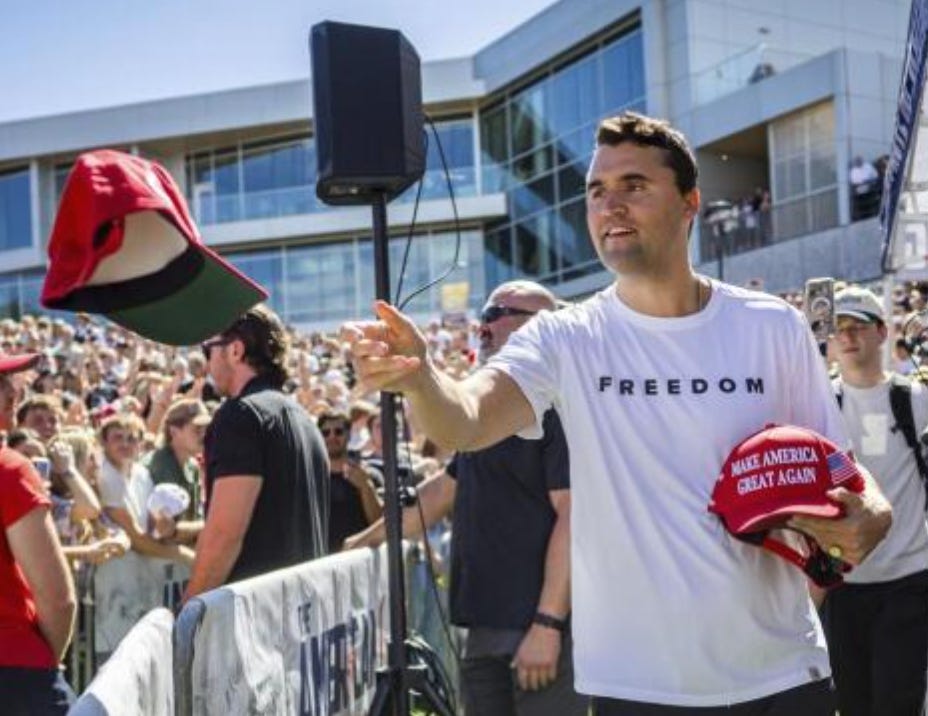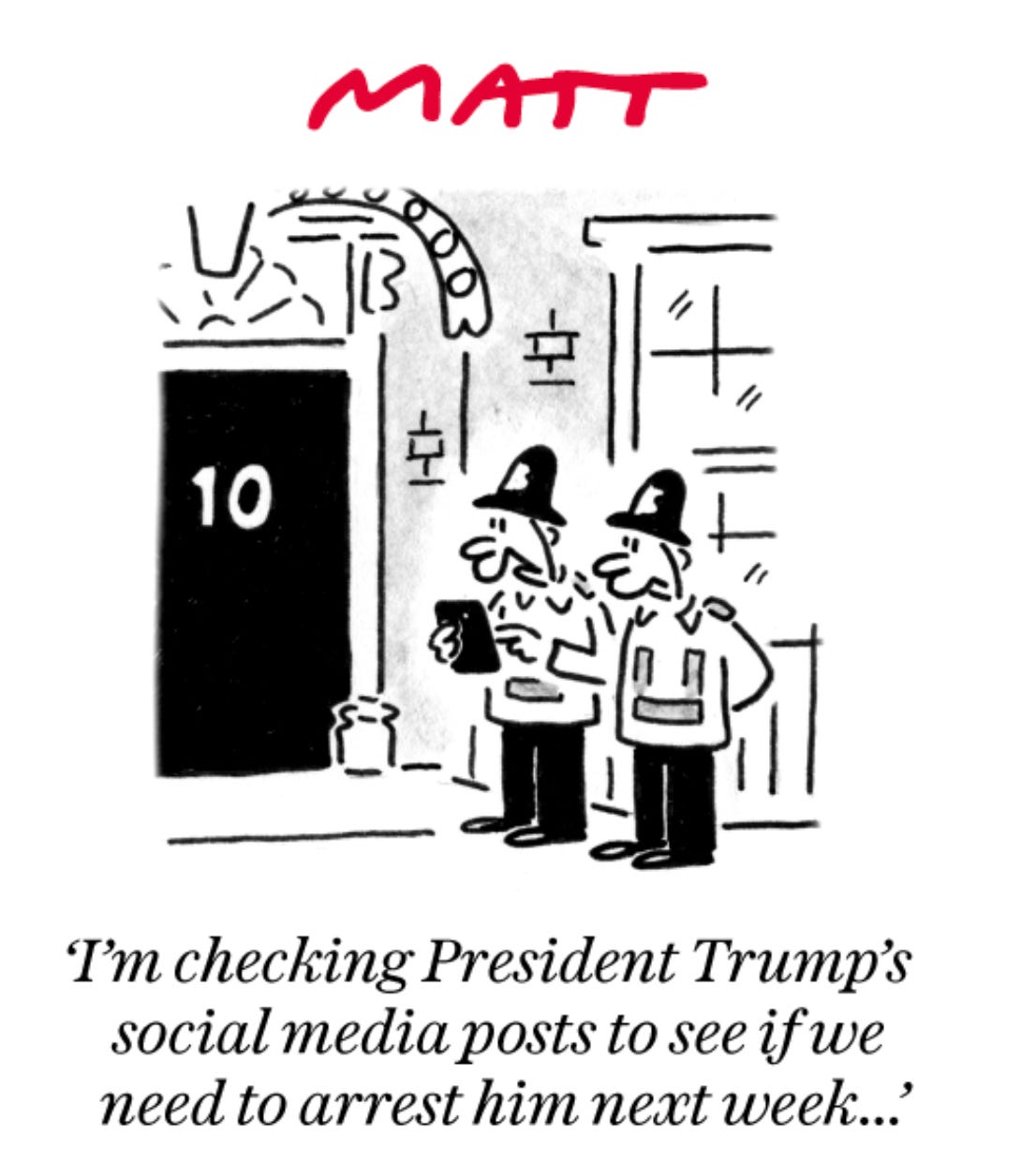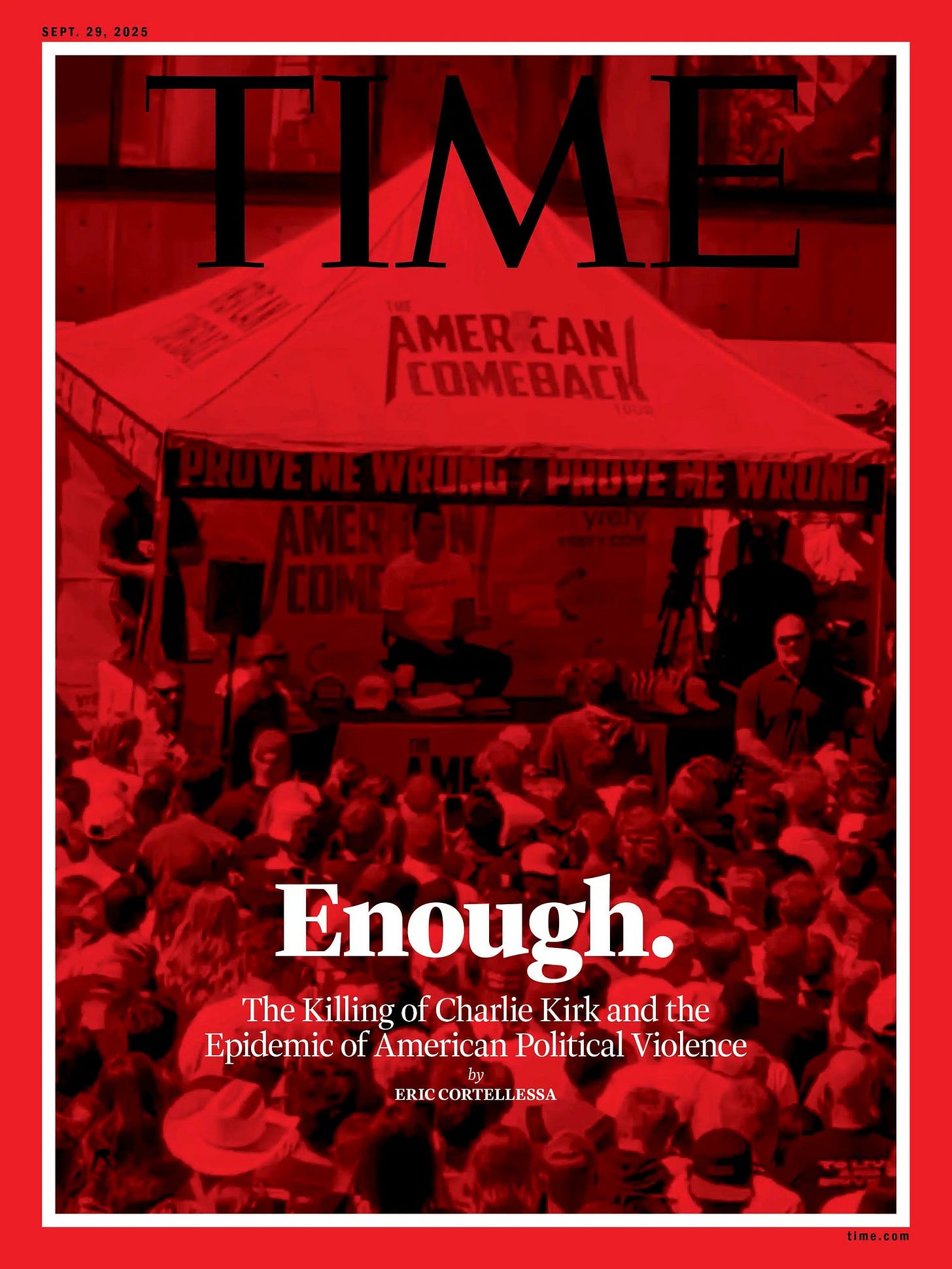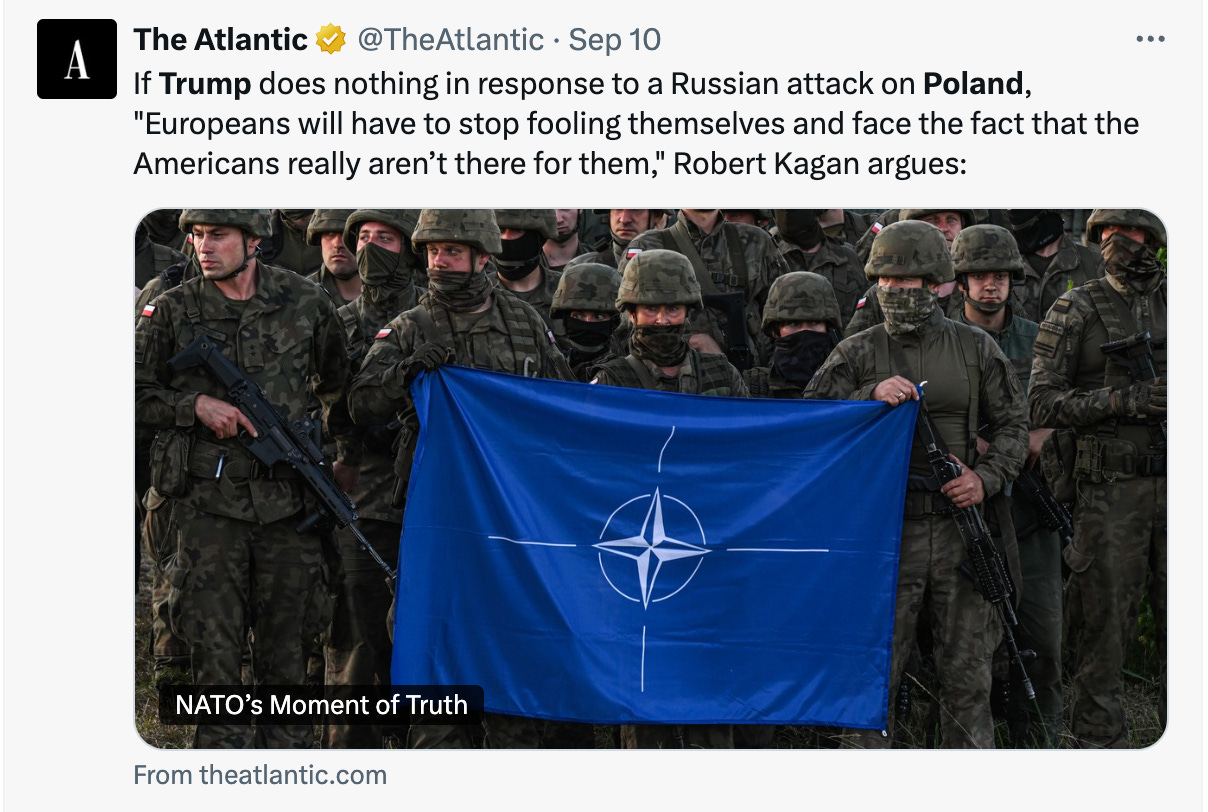Turning Point?
The killing of Charlie Kirk inflamed what still passes for politics in a fractured nation

Where do we go from here?
For the past quarter-century, it was hard to imagine that the collective remembrance of something as life-altering for all Americans as the events of September 11, 2001 could possibly be overshadowed.
But when the high-profile conservative activist and influential founder of Turning Point USA was shot and killed in Utah on Wednesday, it ignited a firestorm of conspiracy, blame and vitriol which has dominated news coverage since and could threaten to pull apart what remains of America’s civil discourse.
Aaron Blake wrote at CNN:
“The 24th anniversary of 9/11 on Thursday is a reminder that America didn’t use to respond to tragedies in this manner. People didn’t leap so eagerly and quickly to speculate about and politicize them, despite having next to no information. There was much less of a focus on capitalizing and more of a focus on our better angels.
“And those better angels often prevailed. People generally declined to reflexively blame the easy culprits. But – and this is the crucial distinction – this didn’t happen without those in power helping guide things in that direction.”
But the New York Times reported that Kirk’s assassination had “deepened lawmakers’ fears of violence directed against them, and the toxic discourse that has fed such threats.”
Coverage of the tragic events on Wednesday demonstrated how traditional media have largely taken a back seat to social channels, particularly among young information consumers, Kirk’s particular constituency. Charlie Warzel at The Atlantic wrote that “Something is very wrong online”, suggesting that the cycle of violence will continue as long as the medium doesn’t change.
“This is the algorithmic internet at work. It abhors an information vacuum and, in the absence of facts or credible information, gaps are quickly filled with rage bait, conspiracy theorizing, doomerism, and vitriol.”
It was almost impossible to avoid seeing footage of the murder, whether you wanted to or not, as social media was flooded with speculation and provocative reactions, few of which were urging – as House Speaker Mike Johnson had done – restraint. Politico reported that Johnson has been trying to avoid Congress being sent “into a tailspin.”
“The Louisianan’s approach is largely in keeping with the way previous speakers might have handled the traumatic situation, but it is out of step with a polarized political culture that has come to color most everything that happens on Capitol Hill.”
After the killing, and before details emerged of the alleged shooter, President Trump had an opportunity to show unifying national leadership but, perhaps predictably, chose another path. Even when he went on Fox News on Friday morning to announce that a suspect was in custody, he was asked “How do we fix this country? How do we come back together?”
His response began: “I couldn’t care less.”
Later on Friday, though, there seemed to be a brief ray of light, when Utah’s Republican Governor Spencer Cox urged society to find an “off-ramp from political violence”. And he gave an impassioned appeal specifically to young Americans.
He said, in part:
“You are inheriting a country where politics feels like rage. It feels like rage is the only option.”
“Your generation has an opportunity to build a culture that is very different than what we are suffering through right now. Not by pretending differences don't matter, but by embracing our differences and having those hard conversations.
“We will never be able to solve all the other problems, including the violence problems that people are worried about if we can't have a clash of ideas safely and securely, especially those ideas with which you disagree.”
Cox certainly understands he could become a rhetorical target himself for saying so. But with the imagery and symbolism surrounding Kirk already building to near-sacred status, the genie is out of the bottle and it will be a true challenge now to get Americans back to something as fundamental as just talking.
It was largely lost in the tidal wave of coverage and disinformation from Utah, but there was another shooting that same afternoon, this one at a high school in Colorado. Two students were wounded before a third, the shooter, took his own life.
CNN reports it was the 47th shooting at a school in the United States so far this year — 24 of which were on college campuses and 23 on K-12 school grounds.
The new edition of Time magazine is their third cover in the past few years bearing that single word. After the 2018 Parkland shooting in Florida which prompted the March For Our Lives movement, a year later the magazine dedicated its front to the sheer numbers of incidents of gun violence that show how “tragically exceptional” America is.
See Also:
‘An Attack On Everything We Stand For’
**
Nato tested by Russian drone threat
In what was described as the “most serious security incident in decades” Nato went on its highest level of alert this week as a stream of Russian drones entered Poland’s airspace. Then, just yesterday, there was another incident with Romania becoming the second Nato member to scramble jets as a Russian attack on neighbouring Ukraine spilled over its border.
Poland’s foreign minister said the drone incursion was a Russian “test.” According to The Guardian:
“Ukrainian president Volodymyr Zelenskyy warned that Russia was deliberately expanding its drone operations and that the west needed to respond with tougher sanctions and closer defence cooperation. The latest drone incursions were “an obvious expansion of the war by Russia”, he said.
“The Russian military knows exactly where their drones are headed and how long they can operate in the air.”
And the latest Russian activity is also a test for President Trump and the extent of his determination to stand up to the Kremlin’s aggression.
Trump posted on social media that he was “ready to do major sanctions on Russia” once Nato countries did the same, suggesting also that Nato impose 50-100 per cent tariffs on China.
President Zelenskyy has also called for European countries to stop purchasing energy from Russia.
According to the BBC:
“Since 2022, European nations have spent around €210bn (£182bn) on Russian oil and gas, according to the think tank the Centre for Research on Energy and Clean Air, much of which will have funded the invasion of Ukraine.
“The EU has previously committed to phasing out the purchases by 2028. The US want that to happen faster - partly by buying supplies from them instead.”
Meanwhile, Secretary of State Marco Rubio arrived in Israel with yet another diplomatic challenge in the wake of its attack on a meeting of members of the Hamas leadership in Qatar, another US ally. That attack appears to have ended moves for an Israel-Hamas ceasefire and a release of hostages, ahead of this week’s meeting of the UN General Assembly, at which the escalation of the conflict in Gaza will be a focus of discussion.
See Also:
**
Admin Digs In Over Epstein Story
With the latest legislative attempt to force the release of all files related to Jeffrey Epstein failing in the Senate, the administration’s stonewall approach became clearer to the so-called “birthday book” at the center of a $10bn law suit between President Trump and the Wall Street Journal.
Meanwhile, Bloomberg News uncovered a trove of thousands of alleged Epstein emails which appear to contradict claims by his associate Ghislaine Maxwell that her work with him “lessened considerably” after 2003.
The Independent also reports that:
“The messages also reveal that he bought more than 600 items from Amazon, including, according to Bloomberg, “an FBI agent costume, teeth whitener, a leather bullwhip, a pair of size 12 Crocs, a prostate massager, girls school uniforms and a box of Nabisco Nilla Mini Wafers.”
And the Epstein scandal crossed the Atlantic this week, leading to the sacking of the British Ambassador to the US, Lord Peter Mandelson, yet another unwanted snag for Prime Minister Keir Starmer ahead of President Trump’s visit to the UK this coming week.

See Also:
‘Whether it’s right or wrong, it’s time to go after people..’
**
Memphis in the Meantime
Finally, the city where Martin Luther King Jr was assassinated in 1968 will apparently be the third Democratic-run city to have National Guard and possibly other troops deployed to its streets as part of the Trump administration’s “crackdown on crime”.
Tennessee’s Republican Governor Bill Lee said he had been “in constant communication with the Trump Administration to develop a multi-phased, strategic plan to combat crime in Memphis, leveraging the full extent of both federal and state resources.”
The Washington Post reported that the city’s mayor, Paul Young said on Friday:
“I want to be clear, I did not ask for the National Guard, and I don’t think it’s the way to drive down crime. However, they are coming. It’s not the mayor’s call. The mayor doesn’t have a say or the authority to stop them from coming, and so my goal is to make sure that as they come, that I have an opportunity to work with them to strategize on how they engage in this community.”
Meanwhile, a man was shot and killed and an ICE agent injured in an incident on Friday in the Chicago suburb of Franklin Park. Earlier in the week, the Trump administration launched “Operation Midway Blitz” in the Second City.
See Also:
***
As always, thanks for reading. I aim to write a baseball-related post midweek – the most recent was about the 30th anniversary of Cal Ripken’s record – and then a politics wrap at weekends.
Usually one is more sane than the other. Especially at this dangerous and deeply confusing moment.
You can find a full States of Play archive here.
And you can also read a Q&A I did last week with historian Chris Birkett, who specialises in the intersection of sports and politics – A Journey Through The Fraying Of America.
“There’s a narrative arc that unites both baseball and politics – and that’s the erosion of symbols, institutions and ideals which once bound people together.”
*



